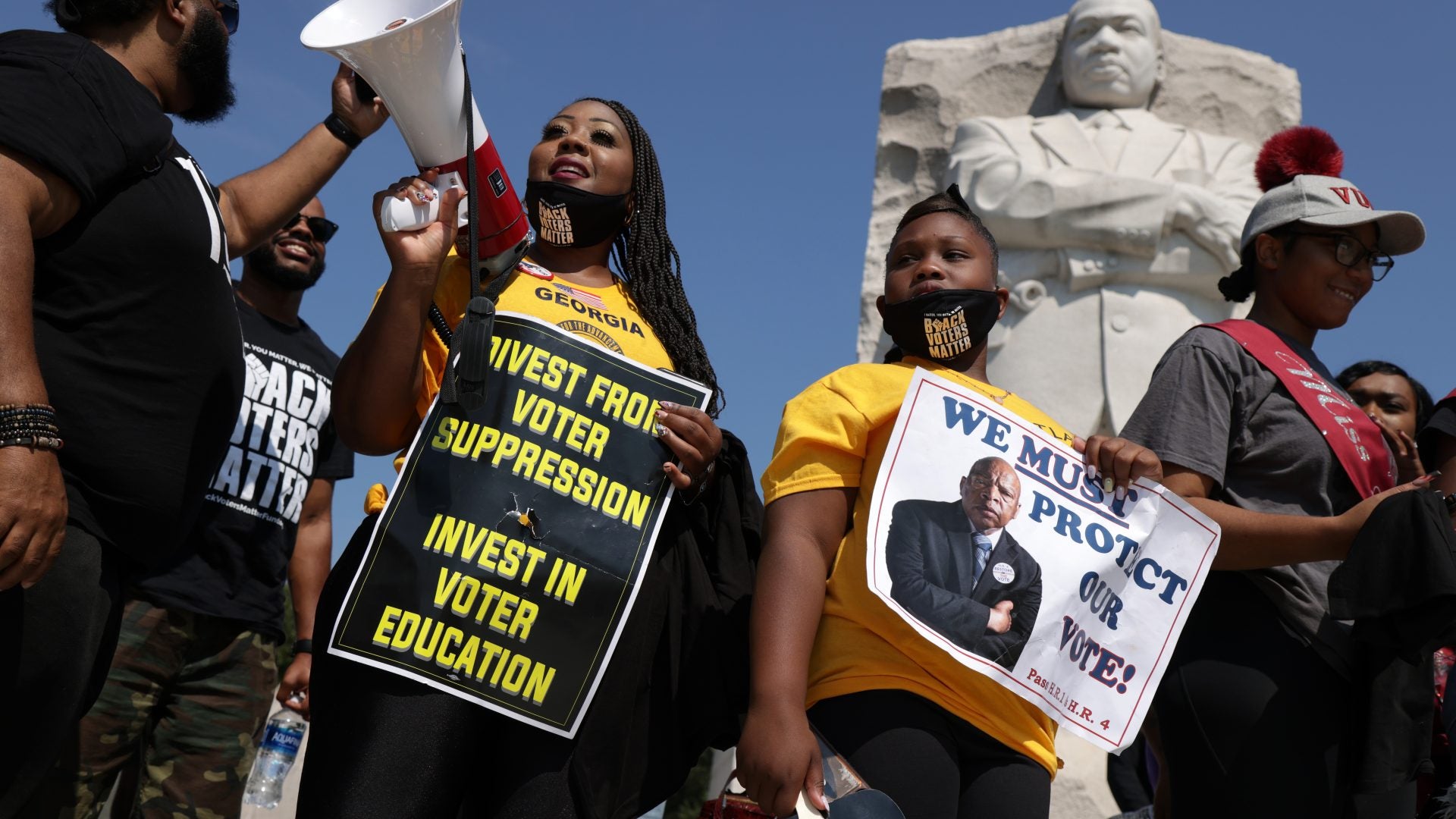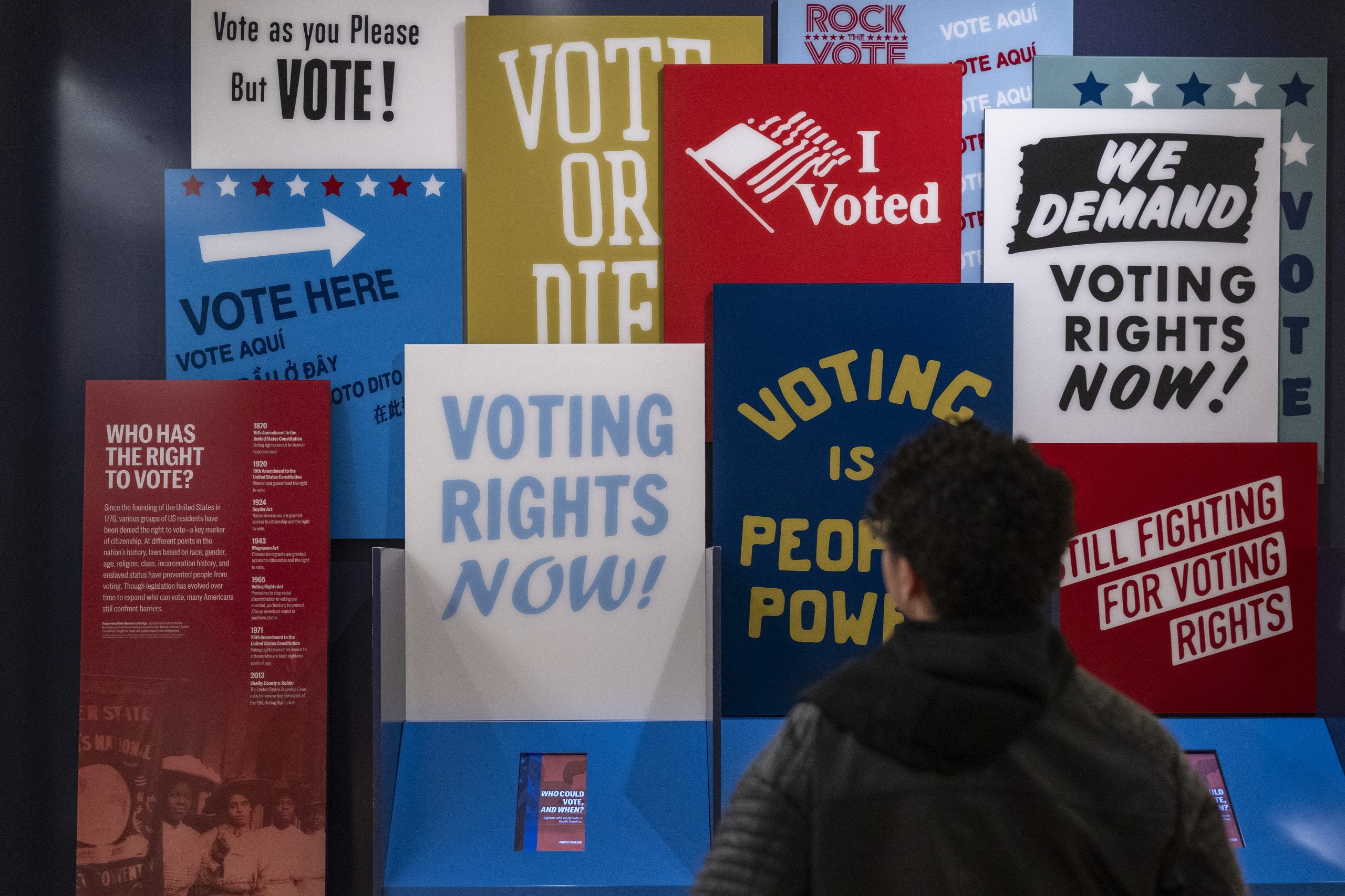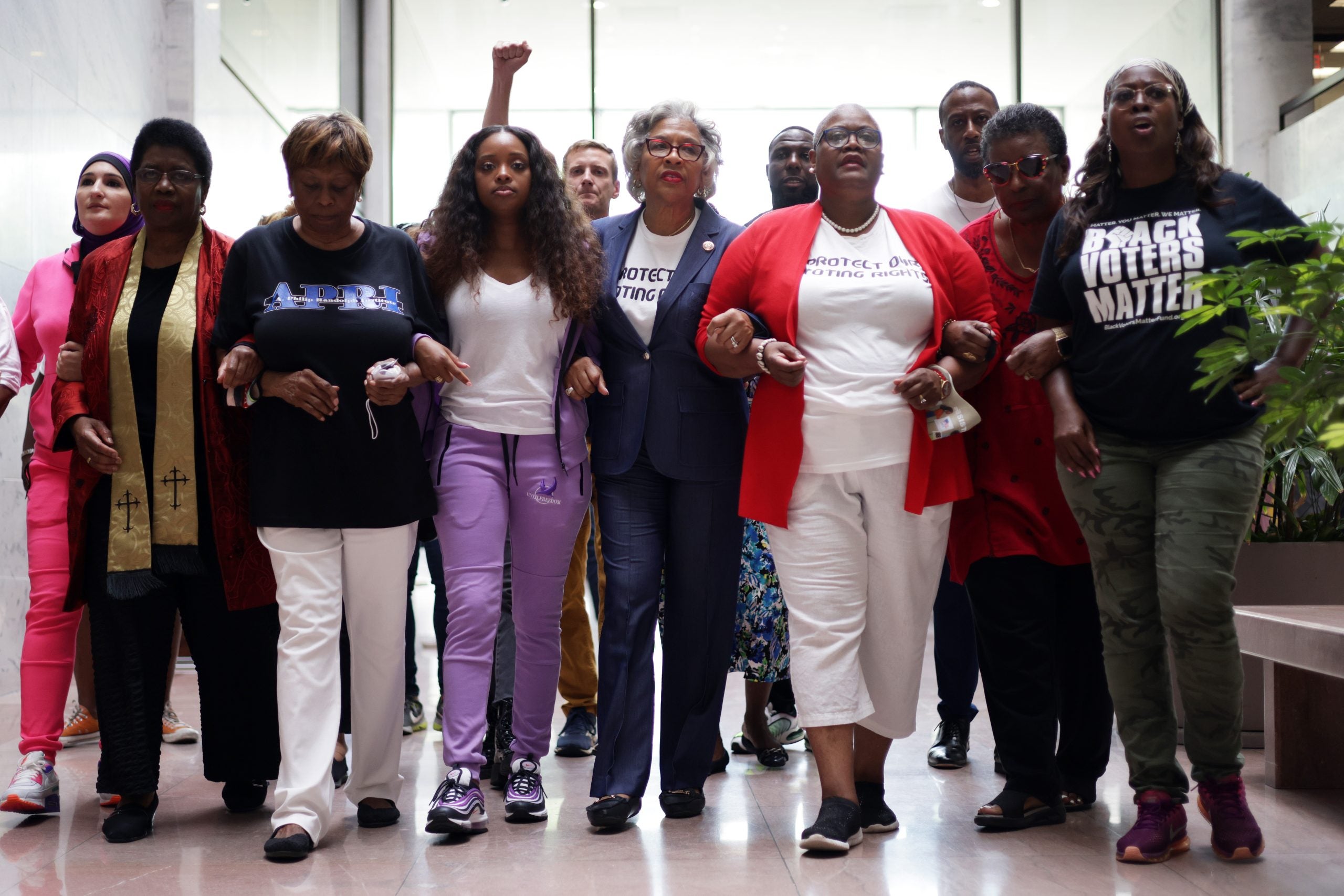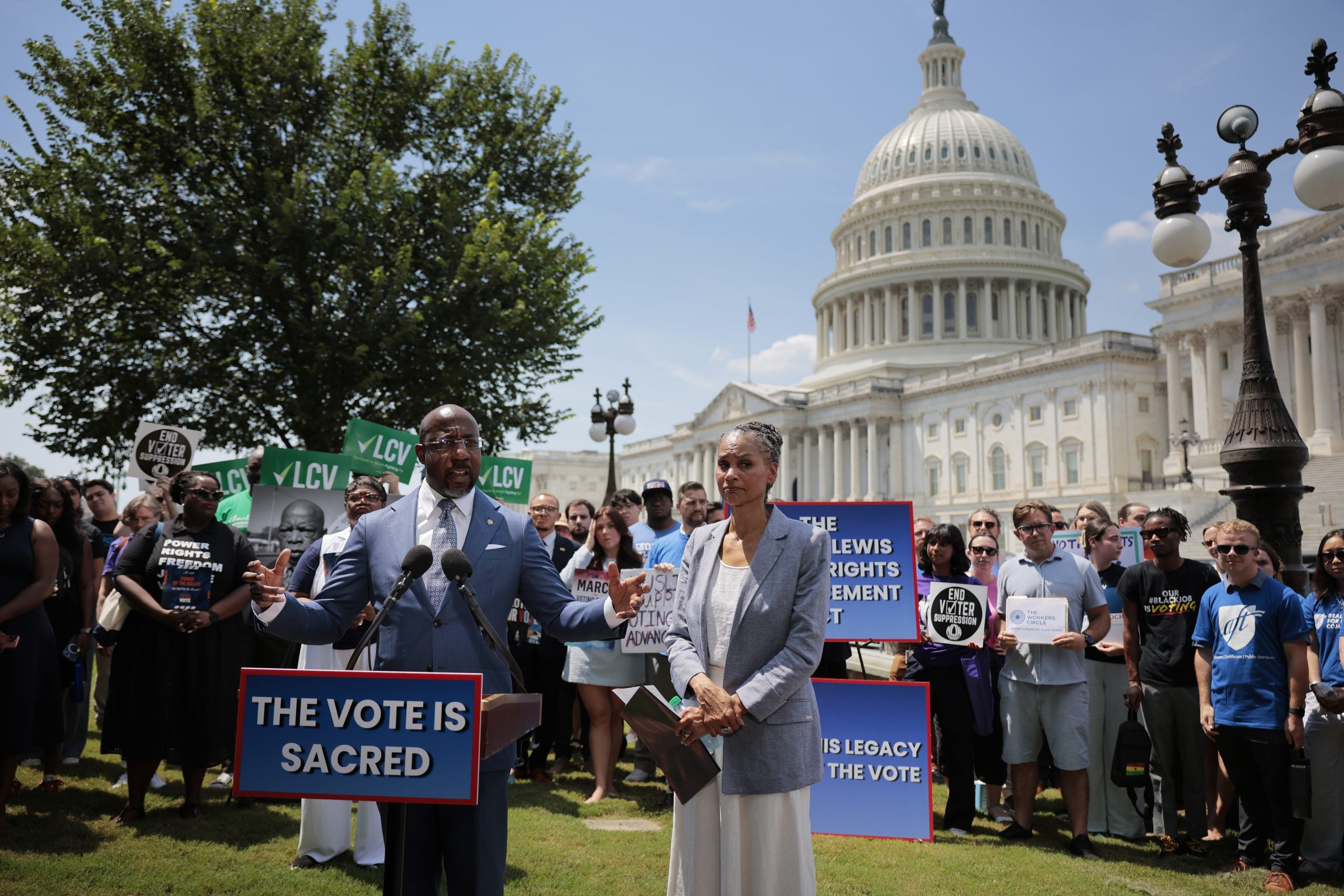

Harrowing footage from the Civil Rights period—brave protesters demanding their proper to vote, met with batons and tear gasoline—nonetheless haunts the American conscience.
These searing photos of state-sponsored violence captured the hazard Black individuals confronted in exercising their constitutional rights earlier than the 1965 Voting Rights Act.
Janai Nelson, President and Director-Counsel of theAuthorized Protection Fund, explains that the obstacles weren’t simply social however had been written into legislation.
“After we tried to traina proper to vote in lots of states, we had been doing that at nice threat to our lives, at nice threat to our livelihoods… literacy assessments, Grandfather clauses—all method of devices had been designed deliberately and fairly surgically to maintain Black individuals out of the poll field.”
The influence of those efforts was unmistakable. Earlier than the act—and the relentless voter registration campaigns that preceded it, simply23% of Black People had been registered to vote. By 1969, it was 61%. In Mississippi, the place voter suppression was particularly egregious, registration jumped fromunderneath 7% in 1965 to 59% by 1968.

It additionally brought on a seismic shift in Black political management. Immediately, there are over 10,000 Black elected officers nationwide, up from simply 300 in 1965.“That has made a big distinction when it comes to how coverage is formed, when it comes to how management is considered. And it’s introduced us a lot nearer to this preferrred of multiracial democracy,” mentioned Nelson.
Nonetheless, not all progress was sustained. The Supreme Court docket’s 2013 determination in Shelby County v. Holder weakened voting protections. Chief JusticeJohn Roberts wrote that the nation had modified so protections had been not wanted.
Mockingly, the very adjustments he cited had been the results of preclearance—a provision that required states with histories of racial discrimination—largely within the South—to get federal approval earlier than altering voting legal guidelines. That safeguard was eradicated and voter suppression legal guidelines have proliferated ever since. Since that ruling, dozens of states have handed legal guidelines that limit entry to the poll, from voter ID necessities to polling place closures and gerrymandering.
“When you strip out preclearance… it takes the enamel away from voting rights. This wasn’t about one thing not wanted—this was a wholesale assault to undermine democracy,” mentioned veteran organizer LaTosha Brown, co-founder ofBlack Voters Matter.

Brown described with alarm how the erosion of voting rights is unraveling democracy itself. “Throughout the board, we’re seeing the seize of energy. We’re seeing the undermining of residents’ rights. We’re seeing the suspension of habeas corpus.”
For these causes, civil rights teams, legal professionals and grassroots activists are fiercely opposing these ways, simply as they did greater than 60 years in the past.
The Authorized Protection Fund channels the spirit of its founder, Thurgood Marshall, to problem voter suppression legal guidelines nationwide. Nelson efficiently argued in Veasey v. Abbott that Texas’ voter ID legal guidelines discriminated in opposition to Black voters throughout Trump’s first administration and stands able to convey lawsuits in opposition to new ones.
LDF additionally backs each reauthorization of the Voting Rights Act (which happens each 25 years) and helps the John R. Lewis Voting Rights Development Act, reintroduced final week by Senator Raphael Warnock and others. The invoice would restore federal preclearance and strengthen voter protections.

In the meantime, LDF is spearheading voting rights protections on the state stage. Colorado, Connecticut, Minnesota and New York have handed their very own Voting Rights Acts. Different states, together with Alabama, Florida, and Texas, have launched related payments.
“I do assume the rising realization that our democracy is rigged goes to have increasingly more People check out what has been carried out previously to guard our democracy, what instruments are being attacked and hopefully to embrace them, as a result of they acknowledge… all of us having unfettered entry to the best to vote [is] a greater system than the one we’ve got, the place all votes are being manipulated,” mentioned Nelson.
On the identical time, outreach and organizing on the group stage stay simply as important.
Along with litigation,the Legal professionals’ Committee for Civil Rights Underneath Regulation companions with grassroots teams to information its election safety work. Theirelection safety coalition consists of over 300 nationwide organizations whose volunteers help in any respect ranges of the voting course of, from registration to casting ballots. Additionally they run a nationwide election safetyhotline.’
“The organizers are those which are serving to us, oftentimes, to get an early heads up on the place a litigative response is perhaps needed, or the place extra public training goes to be essential to make sure that individuals know what they should know with a view to implement their rights” mentioned Shaylyn Cochran, Deputy Director of the Legal professionals’ Committee.
As well as, Brown attracts on Black traditions of tradition and collectivism to mobilize communities.
“To fight the tradition of concern requires collectivism,” she mentioned.
Through the “We Battle Again” bus tour, which mobilized Black voters in 12 states over the last presidential election, the purple, black and inexperienced buses—emblazoned with Black energy fists—turned rolling symbols of defiance and celebration.
“We’re tapping into Black pleasure, as a result of Black pleasure is the antidote to white concern.” Music, too, is a key organizing instrument. It’s used on the bus and is a part of all their voter participation efforts.
“We’ve all the time used music and track and relationship and oration and organizing,” Brown mentioned. “They used freedom songs…they used the concept of actually gathering individuals and tapping into spirit and religion…They used their our bodies to create a way of belonging and a safety of all people. We do the identical factor.”
Regardless of the formidable challenges Black voters nonetheless face, Brown is impressed by the power and resiliency of those that got here earlier than her. Her grandparents, Alabama natives, couldn’t vote till they had been almost 60. Her 91-year-old aunt wasn’t allowed to sit down on the entrance of the bus—but she lived to see her niece personal buses.
“I’m in a position to personal a bus as a result of these of us obtained on buses that had been typically bombed,” she mentioned.
That legacy is why she believes within the energy of the subsequent era to dream greater. “The Voting Rights Act was a car to truly transfer us in the direction of the expression of the total humanity of Black residents and all residents on this nation,” Brown mentioned.
“Younger individuals must construct on that and make it higher. What’s your radical reimagining of the nation—and the way can we get there?”














